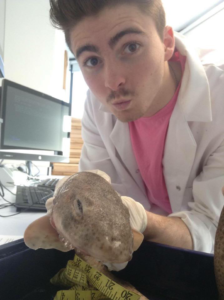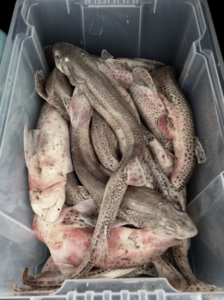https://soundcloud.com/scientistsatsea/sharks-and-microplastics-with-kristian-parton
Show Notes – Mircoplastics and Sharks with Kristian Parton
Of all the pollutants impacting the environment, plastics are perhaps among the most talked about and campaigned against in recent years. We’ve had members of Sail Against Plastic on the podcast before to discuss the presence of plastics in some of the most remote areas of ocean, but in this episode we take a look into how some plastics penetrate further – the invasion of food web ecology by microplastics.

As an undergraduate with the University of Exeter, Kristian developed a strong interest in
marine conservation, specifically elasmobranch (shark and ray) ecology and biology. After being involved in several shark conservation projects around the world, from Mozambique to the Philippines, Kristian went on to start his current research as a Master by Research post-graduate investigating plastic ingestion in several North-East Atlantic shark species; Tope, Dogfish, Smooth-hound, Bull huss and Spurdog. The project aims to investigate whether diet and foraging behaviour has an influence on the consumption of micro plastic, and its accumulation within the digestive tracts of these species.
Is it a dog? Is it a fish? No, it’s a shark…
 Kristian’s research has a broad focus on several small to moderate shark species found in the waters of the UK and North-East Atlantic, most of which are unknown to the wider public – all too often over-shadowed by larger, more cinematic species. The most common species that Kristian works with is the Lesser Spotted Dogfish…or the Small Spotted Catshark…or some may say the Murgey (Scyliorhinus canicula). Whatever you wish to call it, this species exhibit beautiful spotted patterns on a pale body, and are a delight to see in the wild for those lucky enough to spot them among the kelp beds. Though regularly caught in numerous trawl and gill net fisheries, they are not often eaten among Cornwall, though are put to use as bait while Kristian claims a few from local fishermen for science. The exact status of their stocks is unknown though they are thought to be fairly numerous and common. Unfortunately, this is not the case for many of the other sharks that Kristian samples.
Kristian’s research has a broad focus on several small to moderate shark species found in the waters of the UK and North-East Atlantic, most of which are unknown to the wider public – all too often over-shadowed by larger, more cinematic species. The most common species that Kristian works with is the Lesser Spotted Dogfish…or the Small Spotted Catshark…or some may say the Murgey (Scyliorhinus canicula). Whatever you wish to call it, this species exhibit beautiful spotted patterns on a pale body, and are a delight to see in the wild for those lucky enough to spot them among the kelp beds. Though regularly caught in numerous trawl and gill net fisheries, they are not often eaten among Cornwall, though are put to use as bait while Kristian claims a few from local fishermen for science. The exact status of their stocks is unknown though they are thought to be fairly numerous and common. Unfortunately, this is not the case for many of the other sharks that Kristian samples.
For more information on the fisheries of S. caniculla, and other shark and/or marine species click here.
Fake Plastic Seas 
With so much plastic floating around, there is no surprise that it finds its way into the food webs of marine ecosystems. Our news feeds are battered by reports of stranded marine animals whose stomachs are littered with plastics, clips of animals mistaking plastic bags for their primary food sources, and new studies quantifying the presence of micro-plastics in almost all areas of nature. The problem is more than just full bellies of unnatural content, which in of itself is a great concern. Studies have shown that plastics may contain chemical traces that can disrupt systems by which organisms regulate and produce hormones, leading to further and exacerbated biological implications.
To find out more, have a listen to the episode.
If you wish to keep up to date with Kris’s research, give his ever lively twitter a follow @Kjparton
If you want to learn more about LAMAVE – the organisation with which Kristian helped with whale shark research in the Philippines – you can read more here: https://www.lamave.org
You can also view Kristian’s award-winning film here: The Southern Continent: A Journey to Antarctica
Hosted by Ethan Wrigglesworth
Episode and show notes produced by Ben Toulson and Ethan Wrigglesworth
Check out other episodes of the podcast here.
You can subscribe on most podcast apps, if you’re feeling kind please leave us a review!
#ExeterMarine is an interdisciplinary group of marine related researchers with capabilities across the scientific, medical, engineering, humanities and social science fields. If you are interested in working with our researchers or students, contact Michael Hanley or visit our website!

